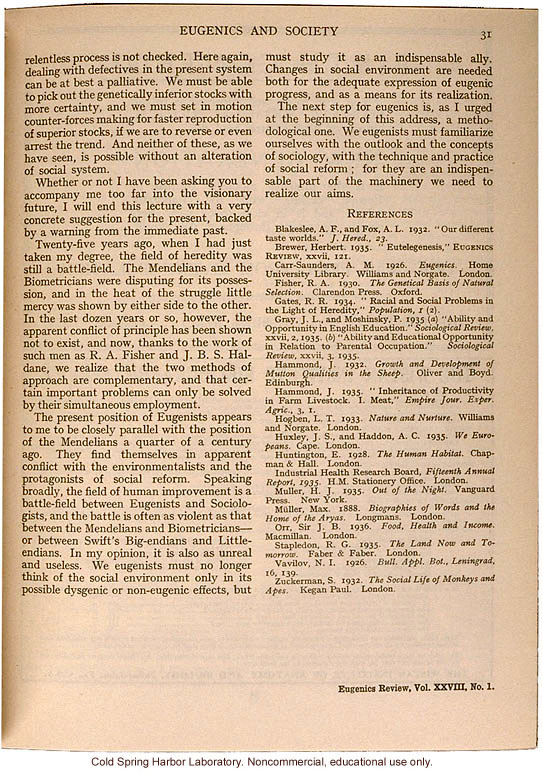"Eugenics and Society" (The Galton Lecture given to the Eugenics Society), by Julian S. Huxley, Eugenics Review (vol 28:1) (20)

"Eugenics and Society" (The Galton Lecture given to the Eugenics Society), by Julian S. Huxley, Eugenics Review (vol 28:1) (20)
1843. Eugenics and Society 31 relentless process is not checked. Here again, dealing with defectives in the present system can be at best a palliative. We must be able to pick out the genetically inferior stocks with more certainty, and we must set in motion counter-forces making for faster reproduction of superior stocks, if we are to reverse or even arrest the trend. And neither of these, as we have seen, is possible without an alteration of social system. Whether or not I have been asking you to accompany me too far into the visionary future, I will end this lecture with a very concrete suggestion for the present, backed by a warning from the immediate past. Twenty-five years ago, when I had just taken my degree, the field of heredity was still a battle-field. The Mendelians and the Biometricians were disputing for its possession, and in the heat of the struggle little mercy was shown by either side to the other. In the last dozen years or so, however, the apparent conflict of principle has been shown not to exist, and now, thanks to the work of such men as R. A. Fisher and J. B. S. Haldane, we realize that the two methods of approach are complimentary, and that certain important problems can only be solved by their simultaneous employment. The present position of Eugenists appears to me to be closely parallel with the position of the Mendelians a quarter of a centure ago. They find themselves in apparent conflict with the environmentalists and the protagonists of social reform. Speaking broadly, the field of human improvement is a battle-field between Eugenists and Sociologists, and the battle is often as violent as that between the Mendelians and Biometricians - or between Swift's Big-endians and Little-endians. In my opinion, it is also as unreal and useless. We eugenists must no longer think of the social environment only in its possible dysgenic or non-eugenic effects, but must study it as an indispensable ally. Changes in social environment are needed both for the adequate expression of eugenic progress, and as a means for its realization. The next step for eugenics is, as I urged at the beginning of this address, a methodological one. We eugenists must familiarize ourselves with the outlook and the concepts of sociology, with the technique and practice of social reform; for they are an indispensable part of the machinery we need to realize our aims. References [reference text] Blakeslee, A.F., and Fox, A. L. 1932. "Our different taste worlds." [italics]J. Hered., 23[end italics]. Brewer, Herbert. 1935. "Eutelegenesis," Eugenics Review, xxvii, 121. Carr-Saunders, A. M. 1926. [italics]Eugenics[end italics]. Home University Library. Williams and Norgate. London. Fisher, R. A. 1930. [italics]The Genetical Basis of Natural Selection.[end italics] Clarendon Press. Oxford. Gates, R. R. 1934. "Racial and Social Problems in the Light of Heredity," [italics]Population, I[end italics] 2. Gray, J. L., and Moshinsky, P. 1935. (a) "Ability and Opportunity in English Education." [italics]Sociological Review,[end italics] xxvii, 2, 1935. (b) "Ability and Educational Opportunity in Relation to Parental Occupation." [italics]Sociological Review,[end italics] xxvii, 3, 1935. Hammond, J. 1932. [italics]Growth and Development of Mutton Qualities in the Sheep[end italics]. Oliver and Boyd. Edinburgh. Hammond, J. 1935. "Inheritance of Productivity in Farm Livestock. I. Meat," [italics]Empire Jour. Exper. Agric.,[end italics] 3, I. Hogben, L. T. 1933. [italics]Nature and Nurture.[end italics] Williams and Norgate. London. Huxley, J. S., and Haddon, A. C. 1935. [italics]We Europeans.[end italics] Cape. London. Huntington, E. 1928. [italics]The Human Habitat.[end italics] Chapman and Hall. London. Industrial Health Research Board, [italics]Fifteenth Annual Report, 1935.[end italics] H.M Stationery Office. London. Muller, H. J. 1935. [italics]Out of the Night.[end italics] Vanguard Press. New York. M[umlaut over 'u']ller, Max. 1888. [italics]Biographies of Words and the Home of the Aryas.[end italics] Longmans. London. Orr, Sir J. B. 1936. [italics]Food, Health and Income.[end italics] Macmillan. London. Stapledon, R. G. 1935. [italics]The Land Now and Tomorrow.[end italics] Faber & Faber. London. Vavilov, N. I. 1926. [italics]Bull. Appl. Bot., Leningrad,[end italics] 16, 139. Zuckerman, S. 1932. [italics]The Social Life of Monkeys and Apes.[end italics] Kegan Paul. London. Eugenics Review, Vol. XXVIII, No. 1. [end]
- ID: 11758
- Source: DNALC.EA


